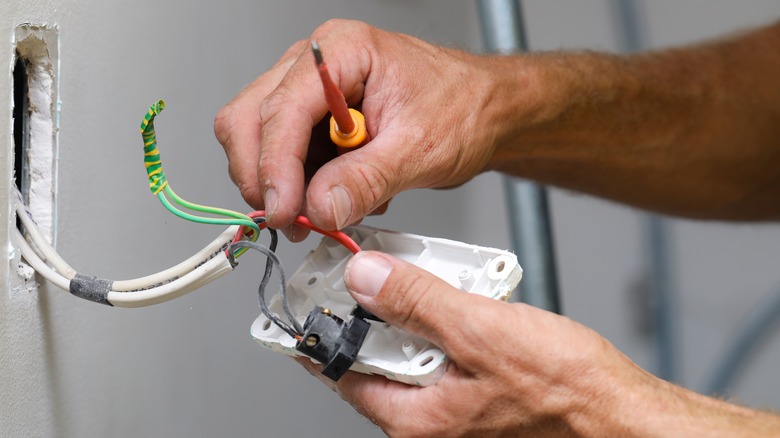What A Catfish Home Really Is, According To HGTV's Why The Heck Did I Buy This House
Many people are familiar with the term "catfish" when it comes to dating. Unfortunately, this term can also be applied to a home. Similar to the original term, a catfish home is one that looks updated on the facade but has detrimental issues that have been intentionally covered up. This can be seen on HGTV's "Why The Heck Did I Buy This House," where Kim Wolfe renovated a home that looked like it had upgraded electrical systems, but behind the walls, the electrical systems were outdated.
"Now this is officially a catfish house," Wolfe said in a clip of the episode posted to Instagram after being told of the shoddy electrical work behind the walls. "This was intentionally deceptive. Somebody did this on purpose. They came in, updated the panels, the plates, made it look like it had been rewired. Anybody looking at a house would just take that for face value."
Unfortunately, this kind of deception can be hard to catch. On the surface, the home Wolfe worked on looked updated, but removing the walls revealed just how bad of a state the electrical system was in. In cases like this, hidden issues in a catfished home can cost a homeowner. On average, for a 2,000-square-foot home, rewiring the electrical system can cost between $4,000 and $8,000, a huge unexpected cost for a new homebuyer or when you're already in the middle of a renovation.
What sellers are trying to hide
Of course, it's not true of every person trying to sell their home; however, some sellers are purposefully deceptive in order to present their homes in the best light, leading to a potentially higher selling price and leaving the buyer with the task and cost to fix any issues. This was the case on the episode of "Why The Heck Did I Buy This House," when Kim Wolfe and her team realized the home they were working on had a deceptively upgraded electrical system. However, electrical issues and outdated systems aren't the only potential problems that sellers may try to hide from buyers.
Previous pest issues can often be hidden with cosmetic work. Ants, termites, cockroaches, and rodents can make a home their home, causing damage along the way, especially inside walls and to the foundation. Even when pests are remediated, the damage can still be left behind and covered up down the road. Aging mechanical systems like HVAC or water heaters, being located in a flood zone, drainage issues, and even paranormal problems can be hidden by sellers. Often, homeowners address these situations on the surface by patching cracks or repainting a room without solving the root of the issue. It can then take months, years, or a future renovation for the buyer-turned-homeowner to discover the issues.
Save yourself from being catfished by a home
Searching for a new home can be a long and exhausting process, which can lead a potential homebuyer to get catfished by a new home. Fortunately, there are ways to save yourself from discovering something amiss. One thing that helps is seeing the home in person and not solely trusting the listing photos, as these can be old, distorted, altered, or have filters. Seeing the home in person prevents you from being duped about details like room size, natural light, or layout. You're also able to get a closer look to see if there is potential damage, such as cracks, lifting paint, or condensation on the windows.
When you tour a home, ask the selling agent pointed questions about the property's history: any damage the house may have suffered, including from pests, weather, or water; any cracks in the walls or the foundation that may put the house at risk; if the home has been tested for pyrite, asbestos, and radon, especially in older properties; and any moisture or mold problems, particularly in bathrooms and basements. A good real estate agent can help field these questions.
Another way to protect yourself is to have the sale contingent upon a home inspection. Home inspectors will search for any potential issues with the plumbing and electrical systems, insulation, foundation, and more. Don't be shy about asking your home inspector questions. The more information you have, the less chance there is of being catfished by a new house.


